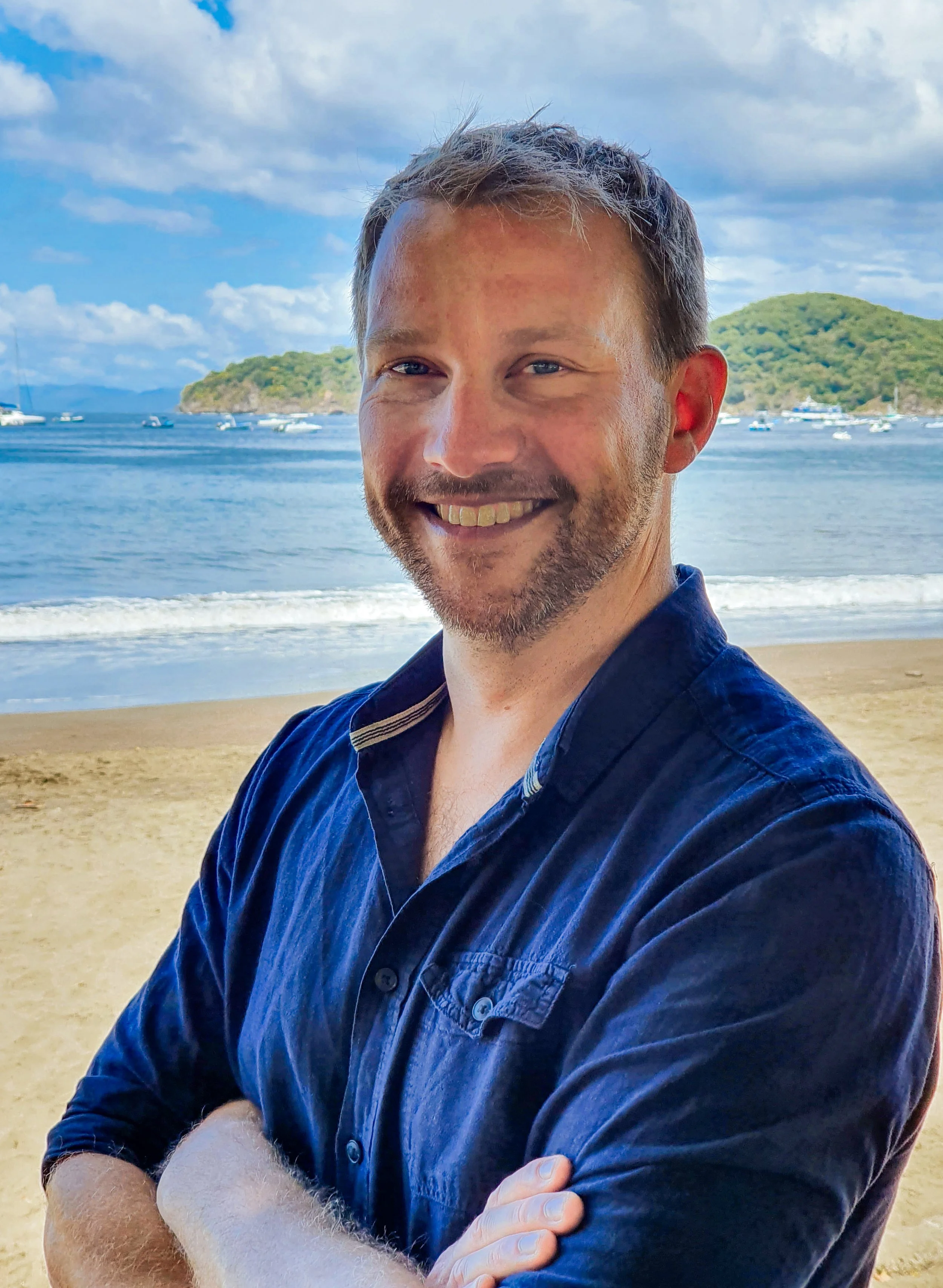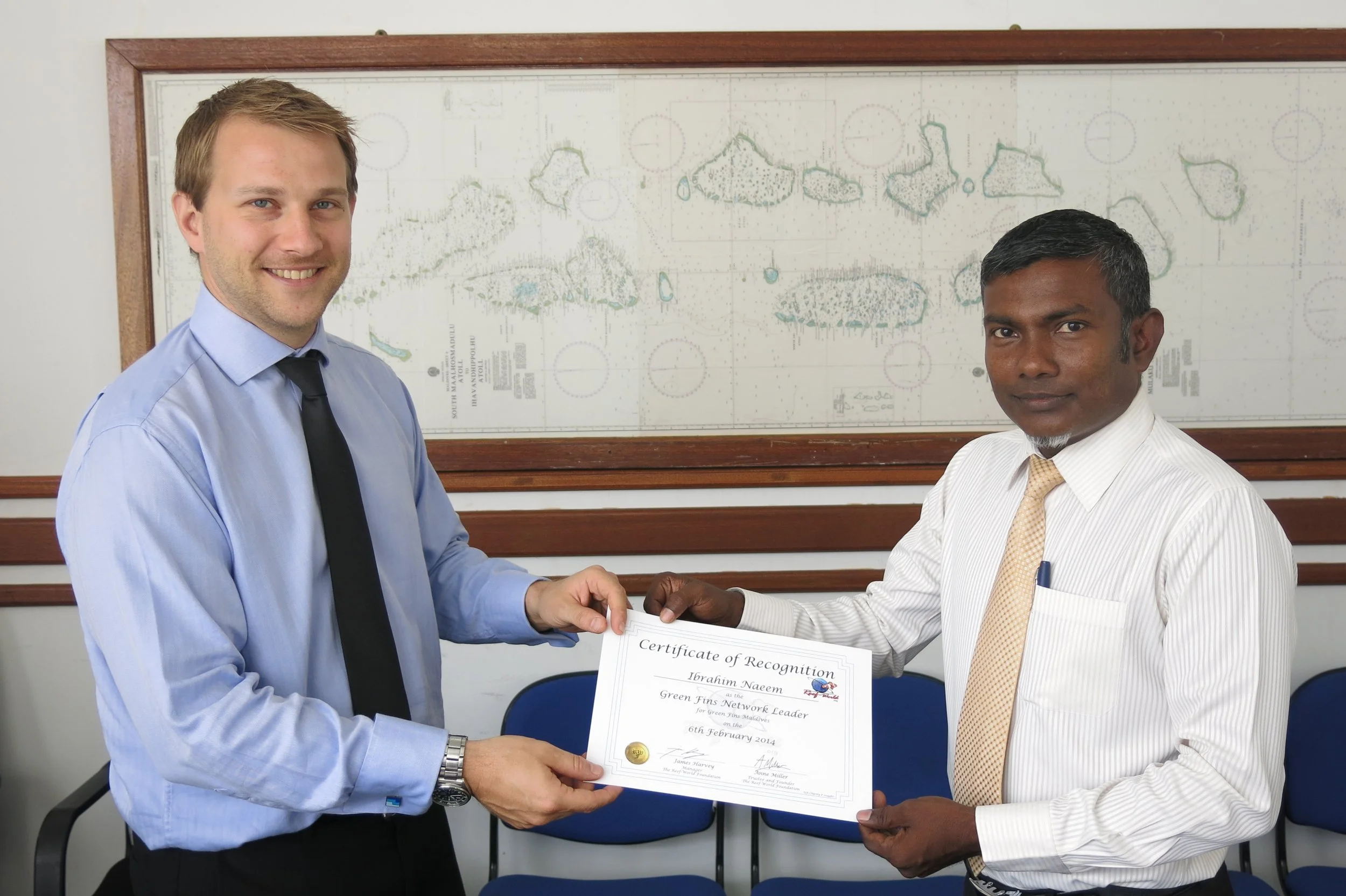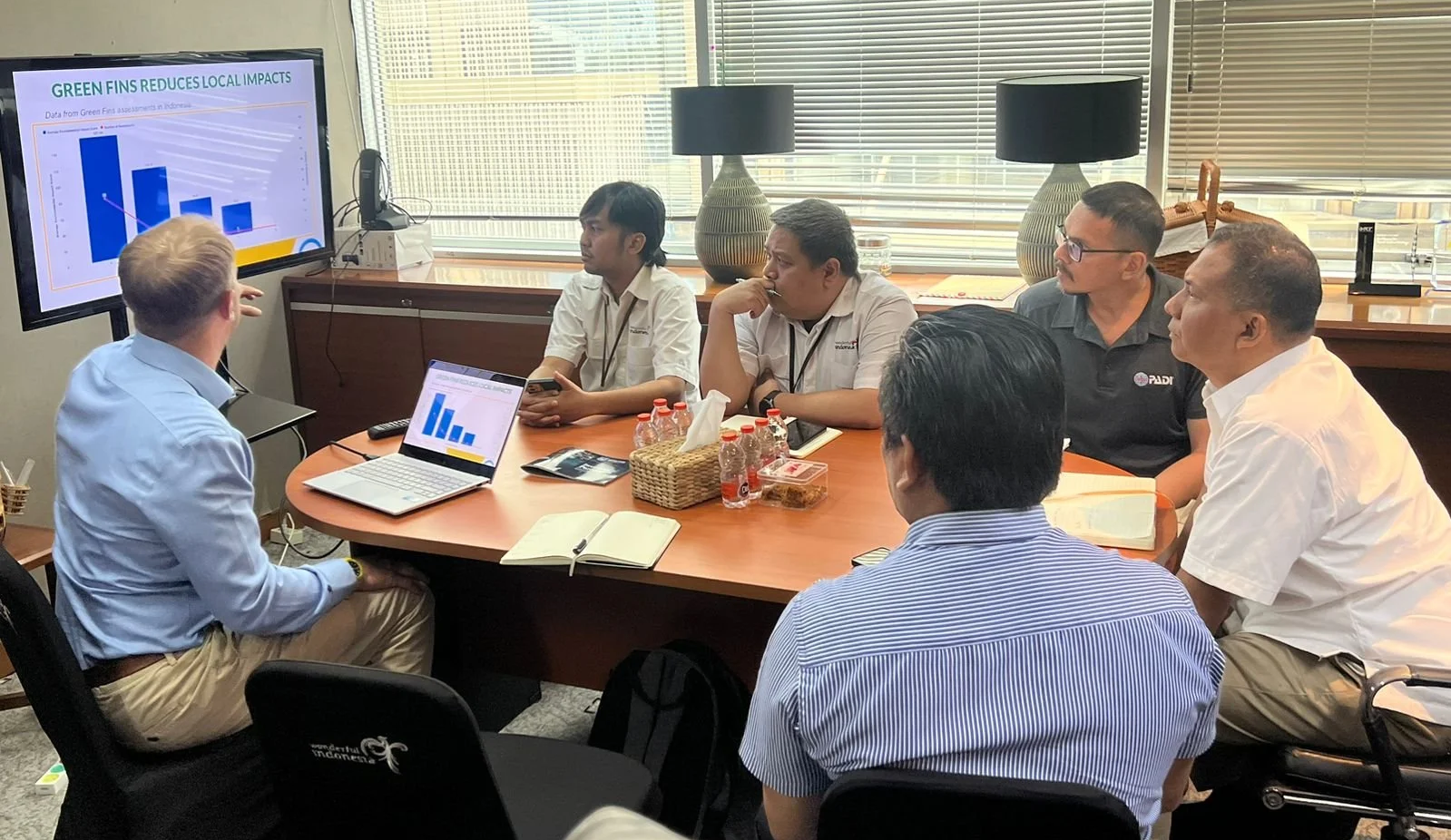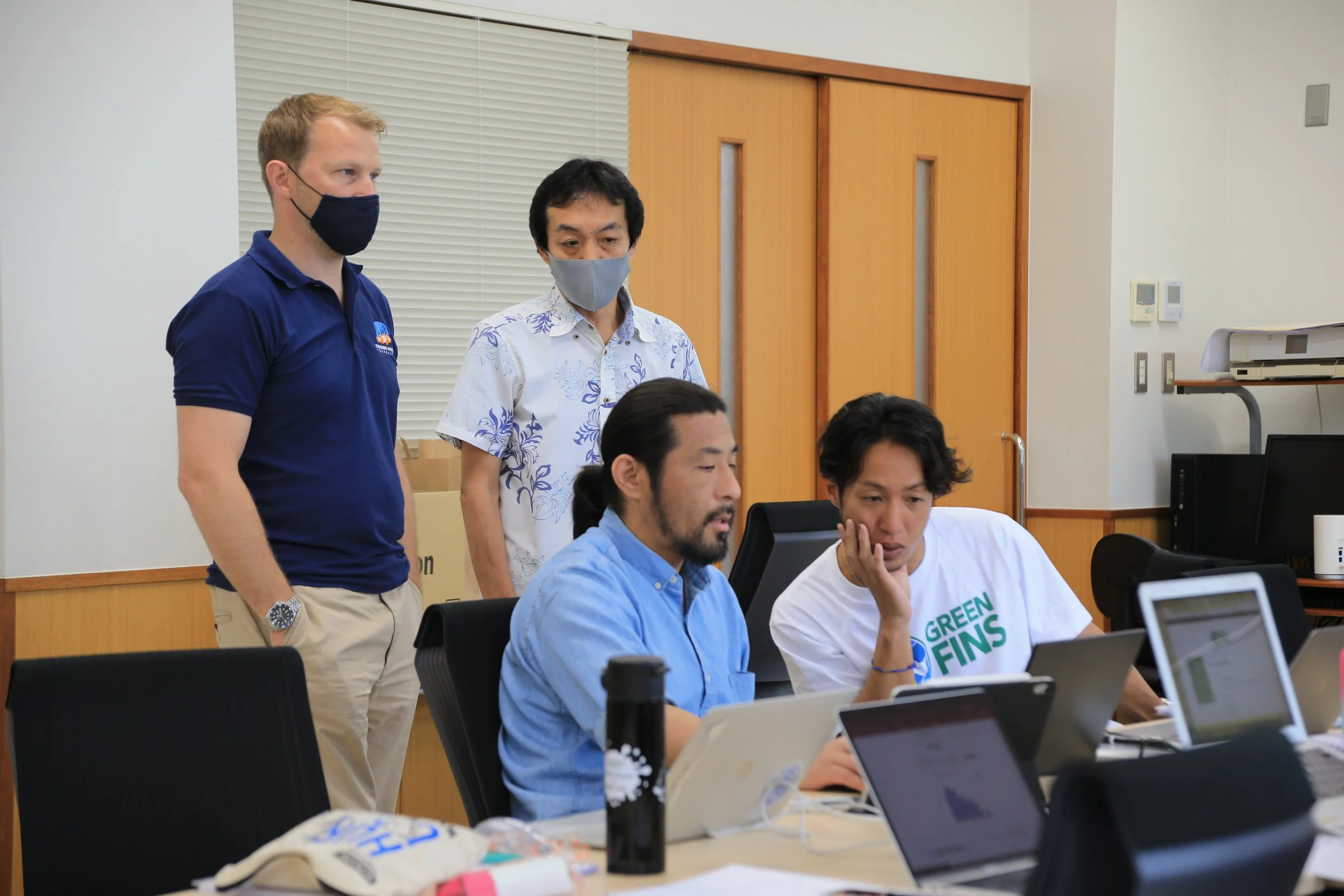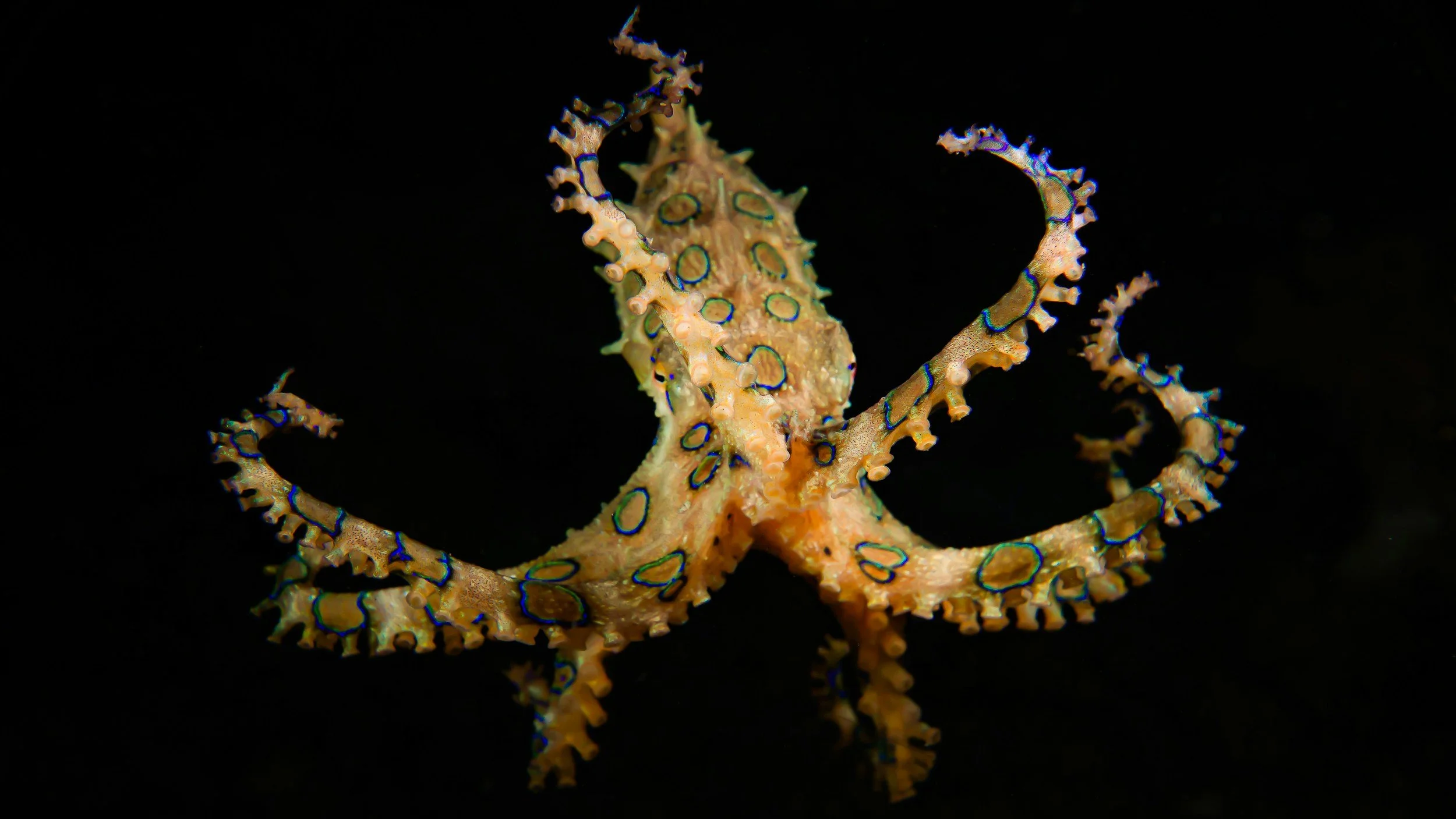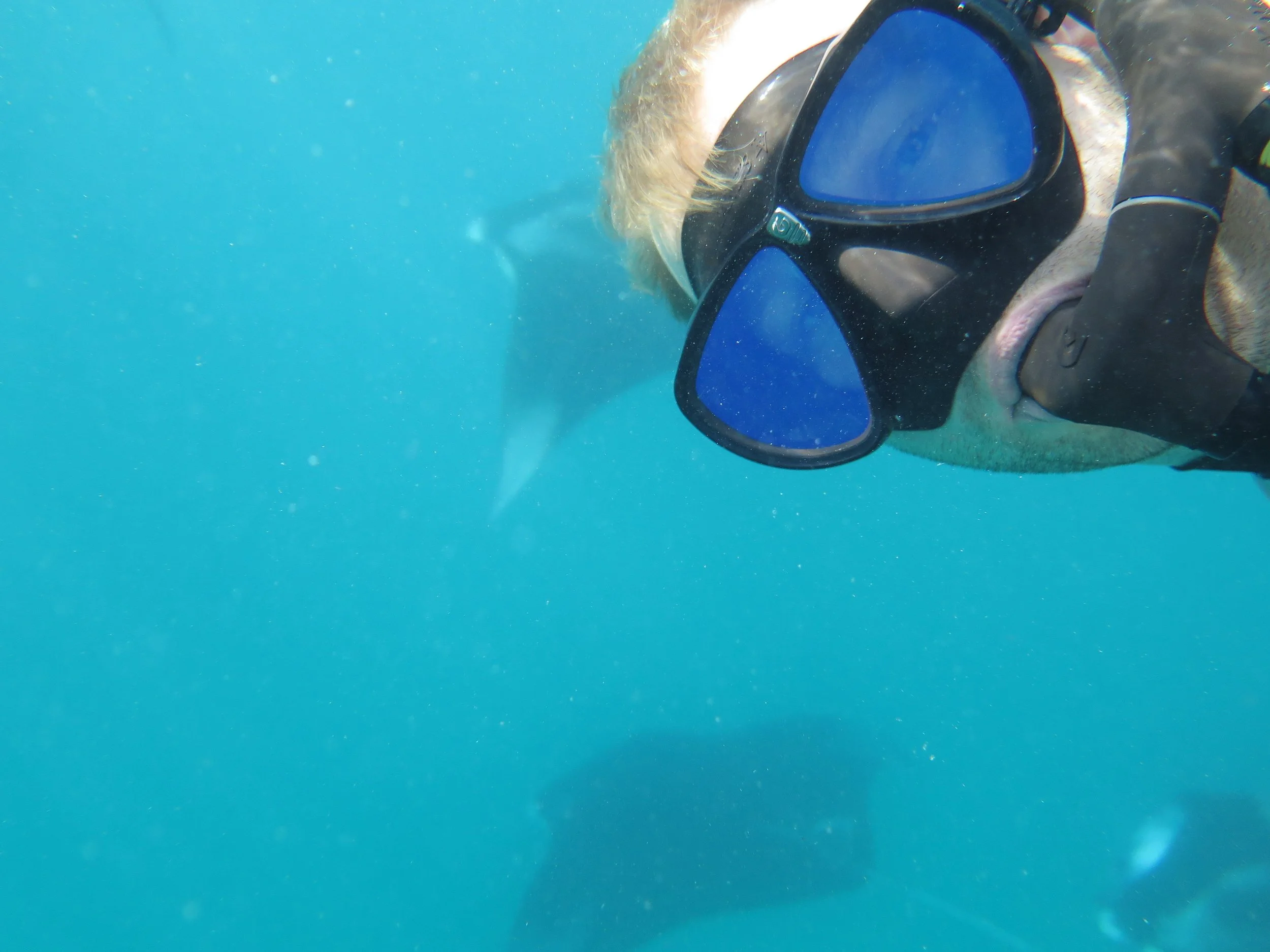Meet JJ: Reef-World's Operations Director
Name: James Harvey
Nickname: JJ
Where are you from?
Bristol, England
What are you best known for?
Being underwater, having a good laugh and a general lack of being afraid.
What’s your background?
Irish mother, English father, lived on the Wales border for a few years and spent most of my younger years outside exploring the sea, woods, countryside and the city of Bristol in my teens. I studied as a Marine Biologist in the UK at Newcastle University which is where I met my wife and co-director of Reef-World, Chloe. After University, both of us did the usual 9 to 5 type jobs in the UK to get some money together to pursue our careers in marine biology. I spent about 18 months overseas in Malaysia, Philippines, Thailand and Indonesia volunteering for universities, NGOs, etc to get that all needed work experience.
What inspired you to get into marine conservation?
I was involved in a lot of pure research, pursuing new scientific findings and discoveries. It was brilliant, and it felt like I found my element. The smell of a laboratory still invigorates a sense of excitement, which I guess is not normal. My mother has said I am not normal for many years, but in a good way. Both my parents have always said I was intrigued by how things work and trying to discover new things. When I was eight, I took a screwdriver to the microwave to take it apart and then put it back together just to see what was inside.
So, I guess, science and research coupled with my other passion for our seas and oceans naturally led me to get into the field of marine biology. As with many career choices and certain fields, there is a large amount to specialise in. While I was working for Universities in Malaysia and the Philippines, I could see people simply doing research for the sake of research and applying for research grants to carry out work just because it hadn’t been done before. To me, it seemed like a wasted opportunity and not fulfilling the potential of being able to analyse data to help the very environment that we are all passionately studying. So, I naturally found myself looking for research projects that can actually use their findings to benefit the environment.
What brought you to Reef-World & why do you care about the work we do?
Both Chloe and I first became involved with Reef-World when we volunteered our time at the Phuket Marine Biological Centre (PMBC) and met the Green Fins Thailand Network Leader, Khun Niphon Phongsuwan. He became a mentor and a big influence on how we operate today. His approach and passion towards protecting corals were infectious and opened our eyes. PMBC was being supported by Reef-World, and it was through volunteering for Green Fins Thailand that we met Anne Paranjoti (nee Miller), who asked us to work for Reef-World.
It is hard to explain to people who are not that aware of the plight of corals and the marine environment as a whole to understand just how important these ecosystems are globally. The jobs, food and overall intrinsic value they provide are enormous, and the tourism industry is basically just abusing this threatened environment purely for economic gain. This is, of course, changing, and I like to think the last 12 years of my work have helped to contribute to this. I can also see enormous potential in the ability to harness this industry to not only reduce its negative impacts but also to help corals thrive in the face of rising sea surface temperatures, increased storms, ocean acidification, overfishing and other wide-scale threats. To see a large internationally operating company, training agency or equipment manufacturer develop new environmental policies that have large-scale positive impacts is incredibly satisfying and is what keeps me going.
What’s your role at Reef-World, and what does that look like?
As Director, I am essentially tasked with the majority of overseeing all aspects and programmes of the charity. I am ultimately responsible for everything we do. This varies from day-to-day running of the charity, but also programme implementation as well. Along with Chloe, we are responsible for charity maintenance such as managing staff, payroll, financial management, all legal aspects of the charity — including reporting to our funders and donors. We’re also responsible for ensuring we are always upholding our charitable objectives and moving in the direction that benefits the general public in the UK and internationally where we operate. I also look after the development and growth of the charity, making sure we are continually able to grow through securing funding, allowing us to have bigger impacts year on year.
As one of the more seasoned Green Fins Assessor Trainers within the team, I also carry out Green Fins training for government and NGO staff while meeting Ministers and heads of departments to help them achieve national and international obligations and environmental targets. This is something I don’t want to change as it allows me to remain connected to the grassroots work, allowing me to remain closely aware of the issues and solutions stakeholders are facing. It is all too often the case that Directors are becoming too far removed from the real-life issues of the very people they are trying to help in the first place. I am often requested to speak at various events such as forums, workshops or to be involved in mainstream media as a spokesperson for the charity or various programmes we are working on.
I spend about 1/3 of my time overseas, and the remaining time I can be found at my computer in our office in Bristol overlooking a large Banksy.
What do you enjoy the most about your role?
I am lucky enough to be able to say there are many aspects of my job that I enjoy, and it’s hard to pick one single aspect. Seeing other people, either at Reef-World or outside, get excited about new developments or achievements you’ve been working on, often for many years, is great. When a member of staff is really pleased about the impact they had that day, based on something you have helped to create, that is fantastic.
I am also privileged to be in a position where people of influence (CEOs, government staff, heads of departments, etc) will listen to me. I might not be able to change laws in a certain country or enforce a no single-use plastic policy across a company, but I am able to influence those who can, which brings me great job satisfaction. I also thrive in working in other countries and being able to experience the challenges of working with different communities and climates. I love meeting people from different backgrounds from myself and understanding other people’s mindsets and attitudes towards the environment.
I am ambitious but realistic, so I wouldn’t be in this sector if I didn’t think we could all achieve great things.
What one piece of advice would you give to someone wanting to get into the marine conservation sector?
Manage your expectations, especially when it comes to earning a large salary or having major impacts. However, I would say the marine conservation sector is the same as any other in that if you want to achieve big things, be prepared to make sacrifices, work hard and be able to pick yourself up when you are down. You must have a positive attitude for this sector, and the threats and issues facing the world’s oceans are only going to increase as populations continue to rise, but this doesn’t mean our collective goal of turning the situation around isn’t impossible. I am ambitious but realistic, so I wouldn’t be in this sector if I didn’t think we could all achieve great things.
Outside work, what are your hobbies/favourite pastimes?
I do love diving, but I guess this could be considered as work. Diving is such a unique sport / experience (call it what you will), but the cliché of ‘being in another world’ is exactly that. We might have evolved from the sea, but we are very much a terrestrial species in 2020. To be able to experience the underwater world for an hour or so is humbling, exciting, and I highly suggest everyone does it at least once in their life. It is never too late. Other than diving, I love bikes (mountain or motor), sailing, surfing (more marine hobbies I know), photography, technology, fixing things and eating.
Photo credit: Kris-Mikael Krister
What’s your favourite marine animal and why?
It is hard as there are many aspects to the marine environment that I enjoy, but yes, krill are not as exciting to see (very important though) as, say, a banded sea Krait looking for its next meal, a flying Gurnard with its pectoral fins out or a 200kg 100 year old giant clam. However, if I were pushed, I would choose an octopus as they are fascinating. The Blue-ringed Octopus is a firm favourite. Trying to find one is half the fun.
What marine animal are you most like and why?
I would like to say something like a Bottlenose Dolphin: intelligent, strong and well-liked, but, in all fairness, I’m probably more like a Harbour seal. Curious, sleeps a lot and is helpful in maintaining the environment in a healthy state.
When and where did you qualify as a diver?
I always wanted to scuba dive from a very early age. I spent my time as a kid in swimming pools trying to breathe through a hosepipe, getting frustrated that it didn’t work. I remember working out how to equalise from a very early age and being pleased I could beat my friends trying to get to the bottom of the deep end because they were getting squeezed. So, as soon as I could learn to dive, I did. It was actually not in the UK like I could have done — but, instead, after I left school, when I was travelling in Thailand on the Cambodia border. I went to Koh Chang, where there was very little development back in 2001, and there were only one or two places to learn to dive. I had a great instructor who, even back then, was keen on making sure I didn’t touch anything. It turned out that this was not only great for the environment but also for our safety, as I came across a large unexploded bomb that was probably jettisoned from a plane during the Vietnam War. I was pointing at it and wanted to know what it was. I probably would have rolled it over to find out more had it not been for the advice of my instructor not to touch anything underwater. This would have been unwise.
Tell us about your most memorable dive…
I have lots that jump to mind, and all for different reasons. Some are because of being lost at sea, having high-pressure hoses rupture, being attacked by Trigger Fish (we have all been there) and the many ‘firsts’ with your first turtle, sea snake, shark or octopus.
However, I think the one that probably stands out the most is a dive I did in Koh Tao in 2008 at Chumphon Pinnacles. That day was my first visit to this site, and there must have been about 50 boats that day, all steaming out to the same site. There are only so many mooring buoys, so they all link up and drop their divers off one after the other. It was like a busy car park at a festival with the number of boats. What I remember the most was the sheer number of divers underwater. They were nearly all novice divers and were bumping into the coral, collecting whatever souvenir they could find, and literally pushing people out of the way. I remember I couldn’t actually see down due to the amount of bubbles, despite the 20m+ vis. It seemed like the water was boiling from all the divers’ exhaled bubbles. It was so surreal having so many people down there, and it didn’t seem right. There were no fish at all.
It was so different from all the dives I’d done previously, and it was a real awakener to me about the overall sustainability of the industry. The site was trashed. I thought ‘How long before no one will come to dive here?’ I had the same scenario in Maya Bay (location of the film The Beach) with all the speed boats. I knew that this was not going to last, and sure enough, they have had to close the site to allow it to recover.
& one diving destination still on your bucket list?
Despite our Asia office only being 230 miles away, I still have not managed to get to the absolute jewel in the middle of the Sulu Sea in the Philippines that is Tubbataha Reef.
Star sign and how you express it:
Virgo – You know what they say about Virgos. They make great…. Cleaners.
If you could have one superpower, what would you choose and why?
The ability to speak every language and accent in the world. You could achieve so much. Building relationships and the ability to understand each other are the keys to solving so many problems.
What’s the strangest injury you’ve ever had?
I used to get tendonitis a lot in my Achilles heel, which was agony. I limped for years with it. Tendonitis is not strange or uncommon… but how it went away is. I was snorkelling in the Philippines when I got what I thought was an electric shock up my leg. I looked down and had a small but obviously very potent jellyfish with its tentacles wrapped around my Achilles heel. It hurt like hell, and I poured vinegar on it, which helped subdue the initial pain. A couple of hours later, the tendonitis no longer hurt and to this day have not had a problem with it. I could literally run on it the next day.
Tell us something most people wouldn’t know about you?
Saltwater makes me sneeze when I dive. Look out for it if you dive with me.
Anything else you’d like to share?
I have the uncanny ability to sleep anywhere, anytime.
JJ snorkelling with manta rays in Maldives

